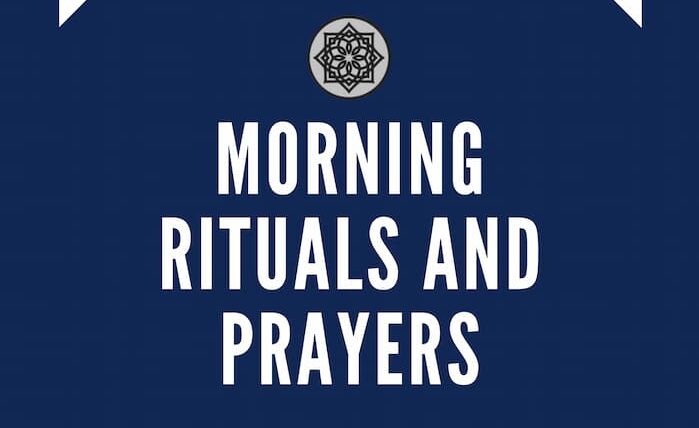Download the Morning Rituals and Prayers Guide.
Sephardic mainstream
MODEH ANI מוֹדֶה אֲנִי (“I am thankful” Morning Praise)
After waking up in the morning, while still lying in bed, one recites Modeh (Modah) Ani. Since this isn’t a berakha and doesn’t mention the name of Hashem, we are permitted to say this before washing our hands. The custom to recite this prayer has its origin in a 16th century work called Seder HaYom. *The Seder HaYom offers Modeh Ani since Maran teaches in S.A. O.C. 46:2 that nowadays our hands are not clean and there is a custom to refrain from saying Elohai Neshama and the morning berakhot until we have arrived in the synagogue [in which we have washed our hands by then, thus implying that we need to wash our hands before we mention the name of Hashem].
NETILAT YADAYIM נְטִילַת יָדָיִם (Washing Hands)
The prevailing custom is to recite Netilath Yadhayim immediately after Modeh Ani and before mentioning the name of Hashem since the belief is that one cannot mention His name with unclean hands. According to this custom, one may not touch eyes, mouth, ears, other body openings, food, or clothes prior to washing hands by N.Y. S.A. O.C. 4:3-5. Many will in fact sleep with a pre-filled vessel and water basin near their bed to wash hands immediately after waking up (after Modeh Ani of course). Wash hands to the wrist. M.T. Hil. Tephillah 4:2, the water must be acceptable for washing hands, that there be a revi’it for each pair of hands, that one wash from (an acceptable) vessel, and that the water comes from the power of a person who pours it (meaning the one who pours has to fill up the vessel)” M.T. Hil. Berakhot 6:6.
ASHER YAṢAR אֲשֶׁר יָצַר (Restroom Prayer)
The Talmud in Berakhot (60b) states to say the berakha of Asher Yaṣar after exiting the restroom. This is done every time one uses the restroom throughout the day.
ELOHAI HANESHAMA אֱלֹהַי הַנְּשָׁמָה (Restoring the Soul)
Most hold that this prayer should be reserved until after one’s hands are clean. See S.A. O.C. 46:2 for the early mentions that would result in today’s custom regarding this practice. Many will group Elohai Haneshama right after the first Asher Yaṣar in the morning.
BIRKHAT HASHACHAR ברכת השחר (Morning Blessings)
RAMBAM writes that we should recite certain berakhot in the morning ONLY as we partake in that particular miṣvah without regards to a particular order. Hil Tephillah 7:4-9. He also writes that one is not allowed to say a berakha unless he is obligated See Hil Tephillah 7:9. For example: If you don’t put on clothes in the morning you don’t say the berakha “clothes the naked,” if you don’t put on shoes, you don’t say “provided me with all my needs”…Hil Tephillah 7:8. Additionally, unless you live having roosters nearby or and put on a Turban, you probably will rarely ever say the corresponding berakhot for those as well.
|
When one rubs his eyes: |
בָּרוּךְ אַתָּה יהוה אֱלֹהֵינוּ מֶלֶךְ הָעוֹלָם, פּוֹקֵחַ עִוְרִים. |
|---|
|
When one sits up in his bed: |
בָּרוּךְ אַתָּה יהוה אֱלֹהֵינוּ מֶלֶךְ הָעוֹלָם, מַתִּיר אֲסוּרִים. |
|---|
|
When one stands: |
בָּרוּךְ אַתָּה יהוה אֱלֹהֵינוּ מֶלֶךְ הָעוֹלָם, זוֹקֵף כְּפוּפִים. |
|---|
|
When one puts on clothes: |
בָּרוּךְ אַתָּה יהוה אֱלֹהֵינוּ מֶלֶךְ הָעוֹלָם, מַלְבִּישׁ עֲרֻמִּים. |
|---|
|
When one puts on a belt: |
בָּרוּךְ אַתָּה יהוה אֱלֹהֵינוּ מֶלֶךְ הָעוֹלָם, אוֹזֵר יִשְׂרָאֵל בִּגְבוּרָה. |
|---|
|
When one puts on shoes: |
בָּרוּךְ אַתָּה יהוה אֱלֹהֵינוּ מֶלֶךְ הָעוֹלָם, שֶׁעָשָׂה לִי כָּל צָרְכִּי. |
|---|
|
When one leaves his home: |
בָּרוּךְ אַתָּה יהוה אֱלֹהֵינוּ מֶלֶךְ הָעוֹלָם, הַמֵּכִין מִצְעֲדֵי גָבֶר. |
|---|
|
When one wraps a cloth around his head: |
בָּרוּךְ אַתָּה יהוה אֱלֹהֵינוּ מֶלֶךְ הָעוֹלָם, עוֹטֵר יִשְׂרָאֵל בְּתִפְאָרָה. |
|---|








Ohr HaChaim Yomi – Emor